Research team

Research Team
FACULTY STAFF
- BARRADO RODRIGO, JOSÉ ANTONIO
- CALVENTE CALVO, JAVIER
- CANTÓ NAVARRO, ENRIQUE
- CID PASTOR, ÀNGEL
- EL AROUDI CHAOUI, ABDELALI
- GIRAL CASTILLÓN, ROBERTO
- GONZÁLEZ MOLINA, FRANCISCO
- GUASCH PESQUER, LUIS
- MARTINEZ SALAMERO, LUIS
- OLALLA MARTÍNEZ, CARLOS
- VALDERRAMA BLAVI, HUGO
- VIDAL IDIARTE, ENRIC
 José Antonio Barrado Rodrigo received the electronic engineering degree from the Universitat de Barcelona (UB),
Spain, in 2000 and the Ph.D. degree in automatic control from Universitat Politècnica de Catalunya (UPC), Barcelona, Spain, in 2008.
José Antonio Barrado Rodrigo received the electronic engineering degree from the Universitat de Barcelona (UB),
Spain, in 2000 and the Ph.D. degree in automatic control from Universitat Politècnica de Catalunya (UPC), Barcelona, Spain, in 2008.
He is currently an Associate Professor with the Department of Electronic Engineering and Automatic Control of the Universitat Rovira i Virgili, Tarragona, Spain. His research interests include analysis, modeling and control of electric generators and power converters applied to renewable energy systems.
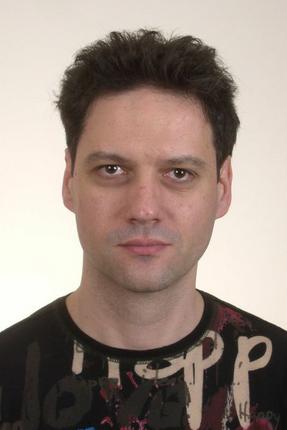 Javier Calvente received the Ingeniero de Telecomunicación degree and the Ph.D. degree from the Universitat Politècnica de Catalunya (UPC), Barcelona, Spain, in 1994 and 2001, respectively.
Javier Calvente received the Ingeniero de Telecomunicación degree and the Ph.D. degree from the Universitat Politècnica de Catalunya (UPC), Barcelona, Spain, in 1994 and 2001, respectively.
He was a visiting scholar with Alcatel Space Industries, Toulouse, France, in 1998. He is currently an Associate Professor with the Departament d'Enginyeria Electrònica, Elèctrica i Automàtica, Universitat Rovira i Virgili (URV), Tarragona, Spain, where he is working in the fields of power electronics and control systems.
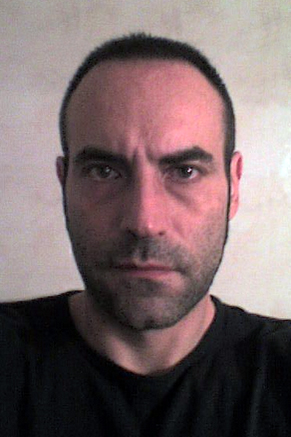 Enrique Cantó obtained his M.S. in Electronics Enginering in 1995 and his Ph.D in 2001 at the Universidad Politécnica de Catalunya (UPC). He has been associate professor since 1996 in the UPC, and assistant professor in the Universitat Rovira i Virgili since 2003.
Enrique Cantó obtained his M.S. in Electronics Enginering in 1995 and his Ph.D in 2001 at the Universidad Politécnica de Catalunya (UPC). He has been associate professor since 1996 in the UPC, and assistant professor in the Universitat Rovira i Virgili since 2003.
Enrique has participated in several National and International research projects related to smart-cards, FPGAs and biometrics. He has published many research papers in journals and conferences. His research interests include hardware accelerators for biometrics algorithms and run-time reconfigurable embedded systems.

Angel Cid-Pastor graduated as Ingeniero en Electrónica Industrial in 1999 and as Ingeniero en Automática y Electrónica Industrial in 2002 at Universitat Rovira i Virgili, Tarragona, Spain. He received the M.S. degree in design of microelectronics and microsystems circuits in 2003 from Institut National des Sciences Appliquées, Toulouse, France.
He received the Ph.D. degree from Universitat Politècnica de Catalunya, Barcelona, Spain, and from Institut National des Sciences Appliquées, LAAS-CNRS Toulouse, France in 2005 and 2006, respectively. He is currently an associated professor at the Departament d'Enginyeria Electrònica, Elèctrica i Automàtica, Escola Tècnica Superior d'Enginyeria, Universitat Rovira i Virgili, Tarragona, Spain. His research interests are in the field of power electronics and renewable energy systems.
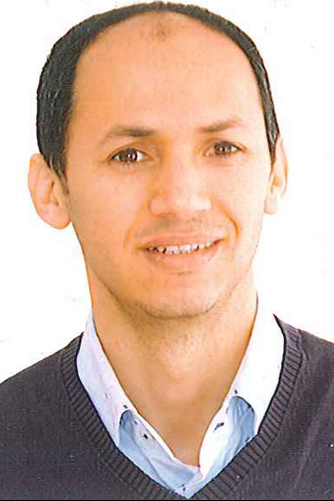 Abdelali El Aroudi was born in 1973. He received the graduate degree in
Physical Science from Faculté des Sciences, Université Abdelmalek
Essaadi, Tetouan, Morocco, in 1995, and the Ph.D. degree (with honors)
from Universitat Politècnica de Catalunya, Barcelona, Spain in 2000.
Abdelali El Aroudi was born in 1973. He received the graduate degree in
Physical Science from Faculté des Sciences, Université Abdelmalek
Essaadi, Tetouan, Morocco, in 1995, and the Ph.D. degree (with honors)
from Universitat Politècnica de Catalunya, Barcelona, Spain in 2000.
During the period 1999-2001 he was a Visiting Professor at the Department of Electronics, Electrical Engineering and Automatic Control, Technical School of Universitat Rovira i Virgili (URV), Tarragona, Spain, where he became an associate professor in 2001 and a full-time tenure Associate Professor in 2005. From September 2007 to January 2008 he was holding a visiting scholarship at the Department of Mathematics and Statistics, Universidad Nacional de Colombia, Manizales, conducting research on modeling of Power Electronics circuits for Energy Management. From February 2008 to July 2008, he was a visiting scholar at the Centre de Recherche en Sciences et Technologies de Communications et de l'Informations (CReSTIC), Reims, France. His research interests are in the field of structure and control of power conditioning systems for autonomous systems, power factor correction, stability problems, nonlinear phenomena, chaotic dynamics, bifurcations and control of switching converters. He has co-authored with co-workers from different universities in Europe, Asia, Africa and America more than 150 international scientific publications and 1 book chapter. He has been involved in different national, and bilateral cooperation projects within his research interests including the areas of control and dynamics of energy management circuits. He has given different invited lectures in Europe, Africa, Latin America and Asia. He has participated in Evaluation Boards for research proposals in Europe (Spain, Romania). He is the 2013-2015 Secretary of the IEEE Circuits and Systems Society Technical Committee of Power and Energy Circuit and Systems (PECAS). He is the co-editor of a special issue on: Design of Energy-Efficient Distributed Power Generation Systems. He has co-organized special sessions related to dynamics and control of switching converters and energy harvesting systems in IEEE ICIT 2003, Maribor, Slovenija, ELECTRIMACS 2005, Hammamet, Tunisia, EPE-PEMC 2006, Portoroz, Slovnija, SSD 2009, Djerba, Tunisia, SSD 2013, Hammamet, Tunisia, NOLTA 2014, Majorca, SPAIN, IEEE ISCAS 2013, Beijing, China, IECON 2013, Vienna, CNSDD 2014, Agadir, Morocco, IEEE ISCAS 2014, Melbourne, Australia, NOLTA 2014, Luzern, Switzerland. He was a track chair of LASCAS 2013 and IEEE ISCAS 2013. He is member of the Scientific Committee of the CNSDD2014, Agadir, May 2014. He is Member of the Scientific Committee of the International Conference on Power Electronics and their Applications, Djelfa, Algeria, Member of the steering committee of Seminar on Automation, Instrumentation and Automatic Control, SAAEI, Co-Chair of the 21st edition of Seminar on Automation, Instrumentation and Automatic Control, SAAEI 2014, Tangier, Morocco, Member of the steering committee of International Conference on Nonlinear Structural Dynamics and Diagnosis, 2014, Agadir, Morocco, member of the steering committee of International Conference on Applied Automation and Industrial Diagnostic, ICAADI 2015 Algeria. He is serving as an Associate Editor of the IEE IET Power Electronics (2014-2017), Journal of Modeling and Simulations (2012-to date), associate editor of International Journal of Renewable and Sustainable Energy (2014-2017). He has supervised 5 PhD thesis completed, 1 on-going PhD student, 10 MSc's thesis students completed. His publications have near 1000 citations and an h-index of 20 according to Google Scholar.

Roberto Giral received the B.S. degree in Ingenieria Técnica de Telecomunicación, the M.S. degree in Ingenieria de Telecomunicación, and the Ph.D. (with honors) degree from the Universitat Politècnica de Catalunya, Barcelona, Spain, in 1991, 1994, and 1999, respectively.
From 1992 to 2000 he was Assistant Professor and from 2000 to 2019 Associate Professor with the Departament d'Enginyeria Electrònica, Elèctrica i Automàtica (DEEEA), Escola Tècnica Superior d'Enginyeria (ETSE), Universitat Rovira i Virgili (URV), Tarragona, Spain, where he is Full Professor since 2019. From 2000 to 2003 he was secretary of the DEEEA. He was academic coordinator of the doctoral program in Technologies for Nanosystems, Bioengineering and Energy of the URV from Oct. 2012 to Jan. 2015. From Jan 2015 to Jun 2018 he was the URV Rector's Delegate for ICTs. Since Feb. 2020 he is the academic coordinator of the Master's Degree in Industrial Engineering of the URV. He has co-supervised five doctoral thesis. His research focuses in the field of power electronics and, in particular, in the design and control of AC/DC and DC/DC converters in DC power buses for automotive applications and for distributed renewable generation systems. He is investigating solutions to seamlessly integrate power supplies such as PV modules with MPPT and current-slope-limited PEMFCs, storage devices like batteries and large capacitors, and pulsating loads. Other important subjects in his research are the parallel-interleaved connection of current- controlled converters, the integrated design of switching power stages and their controllers to achieve the desired closed loop dynamics without subharmonic or chaotic instabilities, and the power regulators design by means of sliding mode and input-output linearization techniques and subsequent implementation of their controllers either in analog, digital or hybrid ways. As a researcher of the GAEI (Automatic Control and Industrial Electronics Group of the URV) he has participated in several private and public R&D projects, being the main researcher at three of the projects supported by the Spanish Government. He is currently director of the GAEI. In 2010 he was elevated to senior member of the IEEE, the Institute of Electrical and Electronics Engineers. As a member of the IEEE Industrial Electronics and Power Electronics Societies, he collaborates regularly as a reviewer in their journals and conferences, in which he has also coauthored most of his scientific contributions.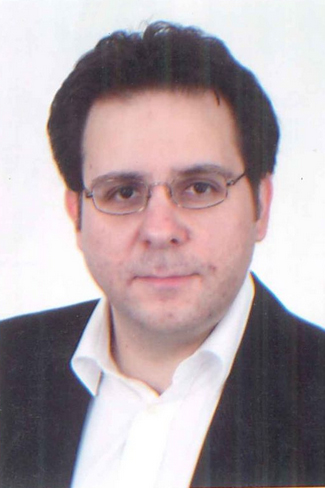 Francisco González Molina was born in Barcelona, Spain. He received the graduate degree Ingeniero Industrial and Doctor
Ingeniero Industrial from the Universidad Politécnica de Cataluña, Spain, in 1996 and 2001, respectively.
Francisco González Molina was born in Barcelona, Spain. He received the graduate degree Ingeniero Industrial and Doctor
Ingeniero Industrial from the Universidad Politécnica de Cataluña, Spain, in 1996 and 2001, respectively.
He has over nine years of experience Research and development projects related to cables / lines areas, and processors on at prestigious universities (Spain, USA, Norway). Awarded a Postdoctoral Fellowship (Fulbright) to work in USA. In addition, he spent four years as corporate director for business development for The Sewedy Cables, one of cable manufacturers and major electrical equipment to worldwide.
Currently, Francisco is Professor Reader in the Departamento de Ingeniería Electrónica, Eléctrica y Automática, Universidad Rovira i Virgili.
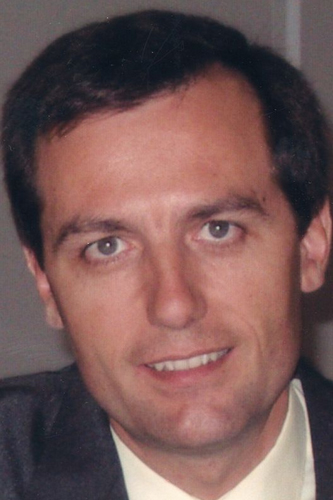 Luis Guasch was born in Tarragona, Spain, in 1964. He received the B.S. degree in industrial engineering and the Ph.D. degree in engineering from the Universitat Politècnica de Catalunya, Barcelona, Spain, in 1996 and 2006, respectively. Currently, he is an Associate Professor in the Department of Electronic, Electrical, and Automatic Engineering, Universitat Rovira i Virgili, Tarragona, where he has been since 1990.
Luis Guasch was born in Tarragona, Spain, in 1964. He received the B.S. degree in industrial engineering and the Ph.D. degree in engineering from the Universitat Politècnica de Catalunya, Barcelona, Spain, in 1996 and 2006, respectively. Currently, he is an Associate Professor in the Department of Electronic, Electrical, and Automatic Engineering, Universitat Rovira i Virgili, Tarragona, where he has been since 1990.
His research interests are electric machines and power system quality.

Luis Martínez-Salamero received the Ingeniero de Telecomunicación degree in 1978 and the Ph.D. degree in 1984, both at the Universidad Politécnica de Cataluña, Barcelona, Spain.
From 1978 to 1992, he taught circuit theory, analog electronics and power processing at the Escuela Técnica Superior de Ingenieros de Telecomunicación de Barcelona, Barcelona, Spain. From 1992 to 1993, he was a visiting professor at the Center for Solid State Power Conditioning and Control, Department of Electrical Engineering, Duke University, Durham, NC. From 2003 to 2004 , 2010 to 2011, and March-September 2018 he was a visiting scholar at the Laboratory of Architecture and Systems Analysis (LAAS), National Agency for Scientific Research (CNRS), Toulouse, France. Since 1995 he has been a full professor with the Department of Electrical Electronic and Automatic Control Engineering , School of Electrical and Computer Engineering, Rovira i Virgili University , Tarragona, Spain, where he managed the Research Group in Automatic Control and Industrial Electronics (GAEI) in the period 1998-2018. His research interests include structure and control of power conditioning systems, namely, electrical architecture of satellites and electric vehicles, as well as nonlinear control of converters and drives, and power conditioning for renewable energy.
Dr. Martínez-Salamero has published a large number of papers in scientific journals and conference proceedings in the fields of modelling, simulation, and control of power converters, and holds a U.S. patent on dual voltage electrical distribution in vehicles. He was guest editor of the IEEE Transactions on Circuits and Systems Special Issue on Simulation, Theory and Design of Switched-Analog Networks (Aug. 1997). He organized in cooperation with the European Space Agency (ESA) the 5th European Space Power Conference (ESPC-98) in Tarragona and served during two terms (1996-2002) as a dean of the School of Electrical and Computer Engineering . He was president of Spanish Joint Chapter of the IEEE Power Electronics and Industrial Electronics Societies from 2005 to 2008 , and distinguished lecturer of the IEEE Circuits and Systems Society in the period 2001-2002. He is currently distinguished professor of Rovira i Virgili University.
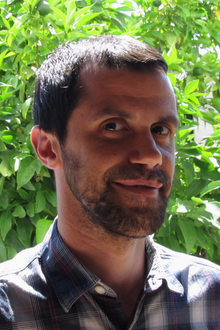
Carlos Olalla obtained the M.S. degree in industrial electronics and automatic control engineering from Universitat Rovira i Virgili, Tarragona, Spain, in 2004, and the Ph.D degree in advanced automatic control from Universitat Politècnica de Catalunya, Barcelona, Spain, in 2009, for his work on robust linear control of power converters, carried out in the GAEI research group of Universitat Rovira i Virgili. In 2007 and 2009, he was a visiting scholar at the Laboratoire d'Analyse et d'Architecture des Systèmes (LAAS-CNRS), Toulouse, France, where he also held a postdoctoral position until March 2010. From 2010 to 2012 he was a visiting scholar and a research associate in the Colorado Power Electronics Center (CoPEC), University of Colorado, Boulder, USA. Since 2013, he has been a research associate with the Dept. of Electrical, Electronics and Automatic Control Engineering, Universitat Rovira i Virgili, where he works on modeling, optimization and robust control synthesis methods for power converters and renewable energy systems.
 H. Valderrama-Blavi received the ingeniero de telecomunicación degree and the Ph.D. degree from the Universitat Politècnica de Catalunya (UPC), Barcelona, Spain, in 1994 and 2001, respectively.
H. Valderrama-Blavi received the ingeniero de telecomunicación degree and the Ph.D. degree from the Universitat Politècnica de Catalunya (UPC), Barcelona, Spain, in 1994 and 2001, respectively.
He is currently an Associate Professor with the Department of Electronic Engineering and Automatic Control of the Universitat Rovira i Virgili, Tarragona, Spain, where he is working in the field of power electornics for renewable energy and distributed generation systems, efficient lighting, high voltage gain conversion, and applications for sillicon carbide devices.
 Enric Vidal-Idiarte received the Licenciado en Informatica degree and the Ph.D. degree from the Universitat Politècnica de Catalunya (UPC), Barcelona, Spain, in 1993 and 2001, respectively.
Enric Vidal-Idiarte received the Licenciado en Informatica degree and the Ph.D. degree from the Universitat Politècnica de Catalunya (UPC), Barcelona, Spain, in 1993 and 2001, respectively.
He is currently an Associate Professor with the Department of Electronics, Electrical Engineering and Automatic Control (DEEEA), Technical School of Engineering (ETSE), Rovira i Virgili University (URV), Tarragona, Spain, where he is working in the field of digital and robust control of power converters and in power electronics systems applied to electric vehicles.
SCHOLARS
- LOPEZ SANTOS, OSWALDO
- VAZQUEZ-SEISDEOS, LUIS
- MANDAL, KUNTAL
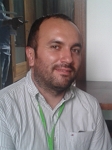 Oswaldo Lopez-Santos received the electronics engineer degree from the Universidad Distrital Francisco José de Caldas in Bogotá - Colombia in 2002, the master degree on industrial automation from the Universidad Nacional de Colombia, Bogotá - Colombia in 2011, and the PhD degree from the Institute National des Sciencies Apliquées (INSA), Toulouse - France in 2015, developing his research project at the Laboratory of Architecture and Systems Analysis of the National Agency for Scientific Research (LAAS-CNRS). Currently, he is a postdoctoral researcher associated to the Automatic Control and Industrial Electronics Group of the URV (GAEI).
Oswaldo Lopez-Santos received the electronics engineer degree from the Universidad Distrital Francisco José de Caldas in Bogotá - Colombia in 2002, the master degree on industrial automation from the Universidad Nacional de Colombia, Bogotá - Colombia in 2011, and the PhD degree from the Institute National des Sciencies Apliquées (INSA), Toulouse - France in 2015, developing his research project at the Laboratory of Architecture and Systems Analysis of the National Agency for Scientific Research (LAAS-CNRS). Currently, he is a postdoctoral researcher associated to the Automatic Control and Industrial Electronics Group of the URV (GAEI).
From 2004 to 2008, he worked in Colombia as design engineer for manufacture of industrial power converters. From 2009 to 2022, he was professor with the Electronics Engineering Department and member of the research group D+Tec in the Universidad de Ibagué, Colombia. In the same institution, he served as Director of the research group D+Tec, Coordinator of the Master on Control Engineering and Director of the Research Office. Dr. López-Santos is currently reviewer for several international journals in academic editorials such as IEEE, MDPI, Elsevier, Taylor & Francis and Springer. His interests are focused on applied control for power processing using electronic converters.
 Luis Vázquez-Seisdedos received a B.S. degree in Automatic Control Engineering, a M.S. degree in Automation, and a PhD degree in Technical Science (Automation), from the Universidad de Oriente, Santiago de Cuba, Cuba, in 1982, 1999, and 2015 respectively. He has received an equivalent Ph.D. degree in Nanosystems Technologies, Bioengineering and Energy from the Rovira i Virgili University, Spain in 2022.
Luis Vázquez-Seisdedos received a B.S. degree in Automatic Control Engineering, a M.S. degree in Automation, and a PhD degree in Technical Science (Automation), from the Universidad de Oriente, Santiago de Cuba, Cuba, in 1982, 1999, and 2015 respectively. He has received an equivalent Ph.D. degree in Nanosystems Technologies, Bioengineering and Energy from the Rovira i Virgili University, Spain in 2022.
His research interests are focused on the control of electromechanical energy conversion systems. Namely, power plants based on both fossil fuel sources and renewable energy resources (RES), electric vehicles (EV), energy storage subsystems and its hybridization, electric drives, electrical traction systems, and RES´s and EV´s integration into electrical power systems. He is currently working on ultra-fast charging of electric vehicles and intelligent active damping in microgrids and electric vehicles. Since 2009, he is a member of the TC 6.3. Power and Energy Systems Committee of IFAC.
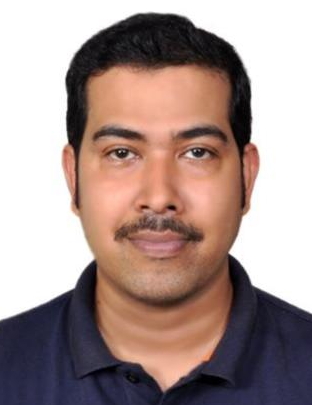 Kuntal Mandal (Member, IEEE) received the B.E. degree from the Jalpaiguri Government Engineering College, North Bengal University, in 2003, the M.E. degree in control systems engineering from Jadavpur University in 2006, and the Ph.D. degree from IIT Kharagpur in 2013, all in electrical engineering. He was a Postdoctoral Research Fellow of the Indian Institute of Science Education and Research Kolkata, India, and King Abdulaziz University, Jeddah, Saudi Arabia, for more than four years (June, 2012 - January, 2017). He served as an Assistant Professor with the Department of Electrical and Electronics Engineering, National Institute of Technology Sikkim for more than 5 years (February, 2017 - August, 2022). Currently he is associated with the Group of Automatic Control and Industrial Electronics in the Department of Electronics, Electrical Engineering and Automatic Control at Universitat Rovira i Virgili, Tarragona, Spain as Beatriu de Pinós Research Fellow. He has more than 40 publications in journals and conferences. His research interests include nonlinear modeling, stability, bifurcation, control of interconnected power electronic systems and their experimental validation.
Kuntal Mandal (Member, IEEE) received the B.E. degree from the Jalpaiguri Government Engineering College, North Bengal University, in 2003, the M.E. degree in control systems engineering from Jadavpur University in 2006, and the Ph.D. degree from IIT Kharagpur in 2013, all in electrical engineering. He was a Postdoctoral Research Fellow of the Indian Institute of Science Education and Research Kolkata, India, and King Abdulaziz University, Jeddah, Saudi Arabia, for more than four years (June, 2012 - January, 2017). He served as an Assistant Professor with the Department of Electrical and Electronics Engineering, National Institute of Technology Sikkim for more than 5 years (February, 2017 - August, 2022). Currently he is associated with the Group of Automatic Control and Industrial Electronics in the Department of Electronics, Electrical Engineering and Automatic Control at Universitat Rovira i Virgili, Tarragona, Spain as Beatriu de Pinós Research Fellow. He has more than 40 publications in journals and conferences. His research interests include nonlinear modeling, stability, bifurcation, control of interconnected power electronic systems and their experimental validation.
GRADUATE STUDENTS
- AHMAD, UBAID
- ESTALELLA RODRIGUEZ, RAMON
- GENARO MUÑOZ, XAVIER
- MAMMERI, NOUHA
- NASSARY, MAHMOUD
- SEBASTIÀ-RULLO, MAX
- VALEDSARAVI, SEYEDAMIN
- ZAMBRANO PRADA, DAVID A.
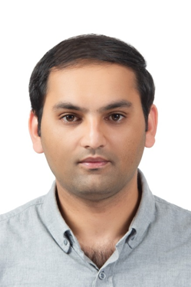 Ubaid Ahmad received the B.S. degree in Electrical Engineering from University of Engineering and Technology, Peshawar, Pakistan, in 2015, and the M.S. degree in Energy Engineering (Majoring in Power Electronics) from Kyungpook National University (KNU), Daegu, South Korea, in 2019. From Aug. 2019 to Aug. 2021, he was a Research Assistant at the Power Electronics and Energy Conversion Laboratory (PEEC Lab.) at the Department of Energy Engineering. He is now enrolled as a Ph.D. candidate in a project (Funded by URV and Marie Sklodowska-Curie Action (MSCA), fellowship 2020MFP-COFUND-20) entitled 'Distributed Power Electronics Architectures for Photovoltaic Power Plants' at the Department d'Enginyeria Electronica, Electrica i Automatica (the Automatic Control and Industrial Electronics Research Group (GAEI)) at Universitat Rovira i Virgili (URV), Tarragona, Spain. His current research interests include high-frequency magnetic design, resonant power conversion, and modeling and control of power converters for photovoltaic power plants and bipolar dc distribution systems.
Ubaid Ahmad received the B.S. degree in Electrical Engineering from University of Engineering and Technology, Peshawar, Pakistan, in 2015, and the M.S. degree in Energy Engineering (Majoring in Power Electronics) from Kyungpook National University (KNU), Daegu, South Korea, in 2019. From Aug. 2019 to Aug. 2021, he was a Research Assistant at the Power Electronics and Energy Conversion Laboratory (PEEC Lab.) at the Department of Energy Engineering. He is now enrolled as a Ph.D. candidate in a project (Funded by URV and Marie Sklodowska-Curie Action (MSCA), fellowship 2020MFP-COFUND-20) entitled 'Distributed Power Electronics Architectures for Photovoltaic Power Plants' at the Department d'Enginyeria Electronica, Electrica i Automatica (the Automatic Control and Industrial Electronics Research Group (GAEI)) at Universitat Rovira i Virgili (URV), Tarragona, Spain. His current research interests include high-frequency magnetic design, resonant power conversion, and modeling and control of power converters for photovoltaic power plants and bipolar dc distribution systems.
 Ramon Estalella Rodríguez received the Industrial Electronics and Automatics Engineering degree in 2018 from the University Rovira i Virgili. He received the master's degree in Electric Vehicle Technologies in 2019 from the University Rovira i Virgili. During 2018 and 2019 he worked as a technician for the GAEI research group. In 2019, he joined the Automatic Control and Industrial Electronics Research Group (GAEI) of the Universitat Rovira i Virgili as a PhD student. His main research interests include renewable energies, switching converters, numerical techniques for power stage design and filtering for power converters.
Ramon Estalella Rodríguez received the Industrial Electronics and Automatics Engineering degree in 2018 from the University Rovira i Virgili. He received the master's degree in Electric Vehicle Technologies in 2019 from the University Rovira i Virgili. During 2018 and 2019 he worked as a technician for the GAEI research group. In 2019, he joined the Automatic Control and Industrial Electronics Research Group (GAEI) of the Universitat Rovira i Virgili as a PhD student. His main research interests include renewable energies, switching converters, numerical techniques for power stage design and filtering for power converters.
 Xavier Genaro-Muñoz received the B.S. degree in Industrial Electronics and Automation Engineering and the M.S. degree in Technology and Electronic Systems Engineering from the Universitat Rovira i Virgili, Tarragona, Spain, in 2017 and 2018, respectively. He joined the Automatic Control and Industrial Electronics Research Group (GAEI) of the Universitat Rovira i Virgili in 2017, where he worked as a research technician supporting some GAEI research projects. In 2020, he joined the GAEI research team where he is working towards his Ph.D. His main research interests include DC-DC and AC-DC converters, control strategies such as Sliding-Mode Control, microgrids management, multi-frequency power transmission, renewable energies and electric vehicle tecnologies.
Xavier Genaro-Muñoz received the B.S. degree in Industrial Electronics and Automation Engineering and the M.S. degree in Technology and Electronic Systems Engineering from the Universitat Rovira i Virgili, Tarragona, Spain, in 2017 and 2018, respectively. He joined the Automatic Control and Industrial Electronics Research Group (GAEI) of the Universitat Rovira i Virgili in 2017, where he worked as a research technician supporting some GAEI research projects. In 2020, he joined the GAEI research team where he is working towards his Ph.D. His main research interests include DC-DC and AC-DC converters, control strategies such as Sliding-Mode Control, microgrids management, multi-frequency power transmission, renewable energies and electric vehicle tecnologies.
 El Nouha Mammeri was born in Algiers. She received the Electrical Engineering degree in 2018 from the Houari Boumediene University of Sciences and Technology (USTHB) in Algiers, Algeria. She received the master's degree in Industrial Systems Engineering from the same university in 2019 and 2020 respectively. In 2022 she joined the Automatic Control and Industrial Electronics Research Group (GAEI) of the Rovira i Virgili University in which she is working towards her PhD degree. Her research is about DC-DC converters, control strategies and electric vehicles.
El Nouha Mammeri was born in Algiers. She received the Electrical Engineering degree in 2018 from the Houari Boumediene University of Sciences and Technology (USTHB) in Algiers, Algeria. She received the master's degree in Industrial Systems Engineering from the same university in 2019 and 2020 respectively. In 2022 she joined the Automatic Control and Industrial Electronics Research Group (GAEI) of the Rovira i Virgili University in which she is working towards her PhD degree. Her research is about DC-DC converters, control strategies and electric vehicles.
 Mahmoud Nassary received his M.Sc. degree from Aswan university, Egypt. He worked as a system design engineer with a USA company in a LED project which was based on a US patent of his. From 2013 to 2016, he was a cofounder and power electronics engineer of Eco Electric solution startup for LED and PV systems. He holds a US patent and has published 8 scientific articles. In 2020, he joined the Automatic Control and Industrial Electronics Research Group (GAEI) of the Universitat Rovira i Virgili where he is working toward his PhD. His main research interests include AC-DC power electronics converters, PFC (Modelling, Control, Analysis, Design) for LED and battery charger applications.
Mahmoud Nassary received his M.Sc. degree from Aswan university, Egypt. He worked as a system design engineer with a USA company in a LED project which was based on a US patent of his. From 2013 to 2016, he was a cofounder and power electronics engineer of Eco Electric solution startup for LED and PV systems. He holds a US patent and has published 8 scientific articles. In 2020, he joined the Automatic Control and Industrial Electronics Research Group (GAEI) of the Universitat Rovira i Virgili where he is working toward his PhD. His main research interests include AC-DC power electronics converters, PFC (Modelling, Control, Analysis, Design) for LED and battery charger applications.
 Max Sebastia-Rullo received the B.S. degree in Industrial Electronics and Automation Engineering and the B.S. degree in Electrical Engineering both in 2020 from the Universitat Rovira i Virgili, in Tarragona, Spain. He received the Master Engineering degree in Electric Vehicle Technologies in 2021 also from Universitat Rovira i Virgili. He joined in 2021 the Automatic Control and Industrial Electronics Research Group (GAEI) , where he worked as a research technician supporting some GAEI research projects. In 2022, he joined the GAEI research team where he is working towards his Ph.D. His main research interests include DC-DC converters, power converter stabilization strategies such as active damping, reutilization of energy losses, renewable energies and electric vehicle technologies.
Max Sebastia-Rullo received the B.S. degree in Industrial Electronics and Automation Engineering and the B.S. degree in Electrical Engineering both in 2020 from the Universitat Rovira i Virgili, in Tarragona, Spain. He received the Master Engineering degree in Electric Vehicle Technologies in 2021 also from Universitat Rovira i Virgili. He joined in 2021 the Automatic Control and Industrial Electronics Research Group (GAEI) , where he worked as a research technician supporting some GAEI research projects. In 2022, he joined the GAEI research team where he is working towards his Ph.D. His main research interests include DC-DC converters, power converter stabilization strategies such as active damping, reutilization of energy losses, renewable energies and electric vehicle technologies.
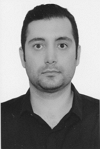 Seyedamin Valedsaravi received the master's degree in Electrical Engineering-Power Engineering in 2015 from Shahid Beheshti University, Iran. He is currently a Ph.D. student at the Automatic Control and Industrial Electronics Research Group (GAEI) of the Universitat Rovira i Virgili (URV). His main research interests include microgrids control, power electronic converters, intelligent optimization methods, and renewable energies.
Seyedamin Valedsaravi received the master's degree in Electrical Engineering-Power Engineering in 2015 from Shahid Beheshti University, Iran. He is currently a Ph.D. student at the Automatic Control and Industrial Electronics Research Group (GAEI) of the Universitat Rovira i Virgili (URV). His main research interests include microgrids control, power electronic converters, intelligent optimization methods, and renewable energies.
 David Alejandro Zambrano-Prada received the Electronical Engineering degree in 2014 and the Master of Control Engineering in 2019 from Universidad de Ibague, Colombia. During 2015 and 2019, he worked a young researcher in the D+TEC research group in the Universidad de Ibague in control of DC-DC converters, energy storage system and microgrids.
David Alejandro Zambrano-Prada received the Electronical Engineering degree in 2014 and the Master of Control Engineering in 2019 from Universidad de Ibague, Colombia. During 2015 and 2019, he worked a young researcher in the D+TEC research group in the Universidad de Ibague in control of DC-DC converters, energy storage system and microgrids.
TECHNICIANS
- HAROUN, REHAM
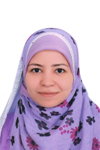 Reham Haroun graduated as an engineer from Power and Electrical Engineering Department, Aswan Faculty of Engineering, South Valley University, Aswan, Egypt, in 2004. She got her master degree from the same University in 2009. She worked as a Lecture Assistant in South Valley University during the period 2004–2009. During the same period, she was a member of Aswan Power Electronics Application Research Center Group.
Reham Haroun graduated as an engineer from Power and Electrical Engineering Department, Aswan Faculty of Engineering, South Valley University, Aswan, Egypt, in 2004. She got her master degree from the same University in 2009. She worked as a Lecture Assistant in South Valley University during the period 2004–2009. During the same period, she was a member of Aswan Power Electronics Application Research Center Group.
She received her Ph.D. degree from Universitat Rovira i Virgili, Tarragona, Spain. She is currently working as a research engineer supporting the GAEI research projects. Her research interests include power electronics applications, microgrids and renewable energy systems.
Organization
ORGANIZATIONAL CHART OF GAEI
- Director: Roberto Giral
- Deputy Director for Education: Enric Vidal-Idiarte
- Deputy Director for Laboratory Infrastructure: Carlos Olalla
| RESEARCH AXES IN PROGRESS (* Head of Research) | |||
| Ultrafast charging | Universal on-board battery charging | Active Damping | Modular Converters for ultrafast charging |
| L.Martínez-Salamero* | J. Calvente* | A. El Aroudi* | O. Lopez-Santos* |
| H. Valderrama-Blavi | R. Giral | A. Cid-Pastor | El Nouha Mammeri |
| J. A. Barrado | E. Vidal-Idiarte | C.Olalla | S. Valedsaravi |
| F. González Molina | L. Guasch | E. Cantó | R. Haroun |
| David A. Zambrano | M. Nassary | M.Sebastià | |
| X. Genaro | R.Estalella | ||
| U. Ahmad | |||
